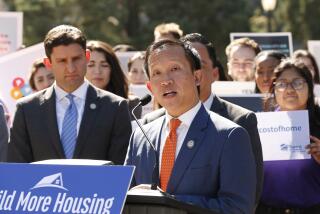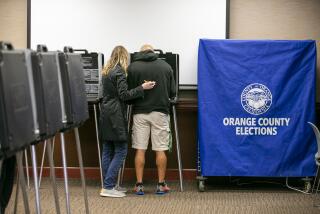Local Officials Join Suit Against Census Bureau
- Share via
Los Angeles and state officials joined representatives of several other large population centers nationwide Thursday in filing a lawsuit against the U.S. Census Bureau to ensure that minorities and the poor are counted accurately in the 1990 census.
The suit hopes to remedy “a subtle form of discrimination . . . that has been going on for years in this nation,” said Los Angeles City Atty. James K. Hahn at a press conference held simultaneously with one in New York City, where the suit was filed. Census under-counts have made “people invisible” and denied them representation and their “rightful share of assistance and government services,” he added.
According to California Atty. Gen. John K. Van de Kamp, about $100 million in federal funds and one, perhaps two, additional congressional seats are at stake in the state. Distribution of such funds, as well as congressional and state legislative reapportionment, are based on population figures.
“We’re paying our taxes. We deserve our fair share,” Van de Kamp told a press conference in Sacramento, pointing out that “more people go uncounted in California than in any other state.” The other plaintiffs in the suit filed in U.S. District Court in New York include the city and state of New York, Chicago, Miami, the National League of Cities and national Latino and black civil rights organizations.
Van de Kamp and Hahn accused the U.S. Department of Commerce, which oversees the Census Bureau and is also listed as a defendant in the suit, of scuttling a recently devised statistical procedure the bureau developed for correcting inaccurate census counts.
In the wake of the Commerce Department’s decision to scrap the procedure, several top officials in the Census Bureau resigned in protest, including Barbara A. Bailar, the former head of the agency’s under-count research staff, Van de Kamp and Hahn said. She will now be a prime witness for the plaintiffs.
‘Post-Enumeration Survey’
The suit seeks a court order to force the Census Bureau to use the statistical procedure, called a “post-enumeration survey,” that would involve contacting 300,000 households nationwide after the official April, 1990, population count. The additional data would then be used to adjust the census count.
Hahn labeled the turn of events “a callous political decision made by the Administration in Washington to deny representation to minorities and the underprivileged in our inner cities.” And Van de Kamp charged that the Commerce Department disregarded the advice of independent experts and “violated a longstanding federal policy of non-interference with technical decisions of the Census Bureau.”
A Census Bureau spokesman, James Gorman, said the decision to do away with the procedure was made by the bureau in conjunction with the Commerce Department.
Would Not Meet Deadline
He said a study by the Census Bureau determined that the post-enumeration survey could be done, but the results of the adjusted count would not be available in time to meet the legal deadline for submitting the census to the President.
Besides, federal officials maintain that it is unlikely that such an adjustment would improve the census’s anticipated count of 99% of the nation’s population, Gorman said. This would represent an improvement over the 1980 census count, which was between 98% and 99% accurate, he added.
But Hahn noted that the under-count tends to be heaviest in urban areas, primarily in minority neighborhoods, high-crime areas and among illegal immigrants, the homeless and those who do not speak English.
He said the 1980 census under-counted 4.6% of Los Angeles’ population, compared to a national under-count average of 1.4%. Hahn said the under-count among blacks in Los Angeles was 9.1%; for Latinos, 9.8%, and Asian-Americans, 7.3%.
More to Read
Sign up for Essential California
The most important California stories and recommendations in your inbox every morning.
You may occasionally receive promotional content from the Los Angeles Times.













